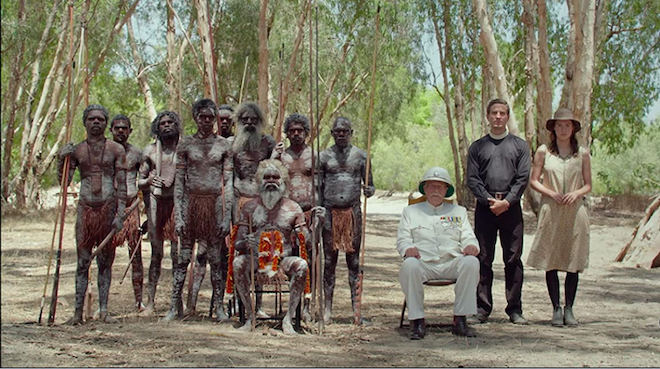High Ground
 Critics' Corner,
Critics' Corner,  Miss Lumière •
Miss Lumière •  Tuesday, February 16, 2021
Tuesday, February 16, 2021 If you occupy the high ground, you control everything ... A white man's war-time notion ... Colonial invasion in all its savagery ... The King's law confronts justice for the dispossessed ... Miss Lumière at the cinema
 Looking for justice
Looking for justice
Watching High Ground on a quiet Sunday evening in Sydney put Miss Lumière in a low, dark place.
This powerful new feature about Australia's all-too-recent brutal history is one of the most beautiful and one of the ugliest films you are likely to see this year.
Set in Arnhem Land in 1919 and 1931 and directed by Stephen Maxwell Johnson of Yolngu Boy fame, High Ground cleverly uses the tropes of a traditional Western to lay bare the violent truth of the colonisation/invasion of Australia and its shameful aftermath.
Told largely from an Indigenous perspective, but written by the non-Indigenous Chris Anastassiades, High Ground opens with bucolic scenes of young Aboriginal boy Gutjuk (Guruwuk Mununggurr) being instructed by his uncle Baywara (a magnetic, if brief, performance by Mark Garrawurra).
The Australian landscape has never looked more ravishing than through the lens of cinematographer Andrew Commis.
Elemental, untouched, almost unreal - until the terrifyingly graphic massacre of an Indigenous family group by a rag-tag group of white men, who are hunting down Aboriginal men suspected of killing a station owner's cow.
Their mission is led by two very different soldiers just returned from World War One.
Simon Baker's ex-sniper Travis is so appalled when he comes upon the massacre overseen by his former military "spotter" Eddie (Callan Mulvey somewhat overplaying the moustachioed villain) that he shoots two of the perpetrators dead.
Travis then gently picks up Gutjuk, the only survivor, and takes him back to the bush Christian mission, where he is brought up by Reverend Braddock (a rather dull Ryan Corr) and his loving sister Claire (Caren Pistorius).
But the seeds of rebellion have been sown. Twelve years later Gutjuk's uncle Baywara (now played by Sean Mununggurr) who survived the massacre, is leading a group of Aborigines hell bent on revenge and restitution of their land.
Known as the "Wild Mob", they murder white station owners and burn their properties with impunity (much like the colonists).
Enter the local chief of police Moran, played by a jagged-looking Jack Thompson, an actor whose screen presence continues to mesmerise.
He enlists Travis, now a bounty hunter, to bring Baywara in to face the King's "justice".
When Travis insists that Gutjuk (now sensitively played by newcomer Jacob Junior Nayinggul) be his guide, the scene is set for an epic tale of internal and external conflict, compromise and betrayal.
This quest to "bring in" Baywara also provides Maxwell Johnson more time to indulge in the sparse beauty of the landscape, and to use it as a dramatic counterpoint to the violence which ensues.
But not before he stages a marvellous, slyly comical exchange about the nature of justice between Aboriginal elder grandfather Dharrpa (a stunning Witiyana Marika) and Moran, each decked out in their tribal finery; Dharrpa in his colourful feathers, Moran sporting the Royal insignia on his stiff white copper's helmet.
The violence which inevitably follows (shoot-outs, spearings and bludgeonings) has several iterations in the lead up to the film's climactic final moments, which ends in another bloody massacre, this time of the whites.
While Gutjuk and his accomplice, female indigenous warrior Gulwirri (movingly played by Esmerelda Marimowa) literally ride off into the sunset, the denouement lingers as a tragedy, not a victory.
High Ground is full of high ideas and low thoughts, of beauty and of terror, of murderous acts and acts of kindness, of heroes and villains, of hope and hopelessness, of law and lawlessness.
Some of the writing is clunky, and some of the characters underwritten, but somehow the film manages to be larger than its screenplay.
It depicts modern Australia as a country founded upon the character of the men (and women) who built it, or as Moran so ruthlessly puts it:
"[Civilisation is built] by bad men doing bad things, clearing the way for others to follow."
It's a film that reckons with the horror of our past, but ultimately disavows anger.
In that sense, High Ground is both necessary and revelatory.
 Film review
Film review 









Reader Comments